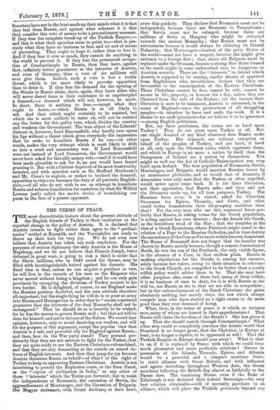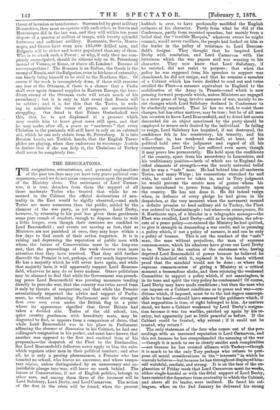THE TERMS OF PEACE. T HE most discreditable feature about the
present attitude of the English friends of Turkey is their exultation at the reported change in the policy of Austria. It is declared that Austria intends to fight rather than agree to the " prelimi- naries " settled at Kezanlik, and the Turcophiles are ready to throw up their hats for very joy. We do not even now believe that Austria has taken any such resolution. For the purposes of serious diplomacy the only Austria is the House of Hapsburg, and we do not believe that Francis Joseph, twice defeated in great wars, is going to risk a third in order that the Slavic millions, who in 1849 saved his throne, may be filled with inextinguishable hatred against his dynasty. His fixed idea is that, unless he can acquire a province or two, he will live in the records of his race as the Emperor who never moved without losing a kingdom ; and he can only gain provinces by occupying the divisions of Turkey nearest to his own border. He is delighted, of course, to see England make the Russian position doubtful, and his own attitude therefore all-important, but the single thing he will do is to pour an army into Bosnia and Herzegovina in order that to "secure a material guarantee that the interests of the dual Monarchy shall not be endangered." That he should do so is heartily to be wished, for he has the means to govern Bosnia well ; but that act will be done for himself, and not in defence of the Sultan. We record that opinion, however, only to avoid deceiving our readers, and will for the purpose of this argument, accept the popular view that Austria is a safe and powerful ally for England against Russia ; and then, how do the War party stand? They pretend per- sistently that they are not anxious to fight for the Pashas, that they are quite ready to see the Eastern Christians enfranchised, and that they are only demanding at the outside an armed de- fence of English interests. And then they jump for joy because Austria threatens Russia on behalf—of what of the right of Turkey to keep on oppressing Eastern Christians. Austria is not interfering to protect the Euphrates route, or the Suez Canal, or the " re'gime of civilisation in India," or any other of those " interests " which the Tories put forward ; but to resist the independence of Roumania, the extension of Servia, the aggrandisement of Montenegro, and the liberation of Bulgaria. Her Magyar statesmen, with Count Andraasy at their head, avow this publicly. They declare that Roumania must not be independent, because there are Roumans in Transylvania ; that Servia must not be enlarged, because there are millions of Serbs in Hungary who might be attracted towards the ancient Monarchy ; that Bosnia must not be autonomous because it would always be claiming its littoral Dalmatia ; that Montenegro—bravest of the petty States of the world—must not have a seaport, because she might give entrance to a foreign fleet ; that, above all, Bulgaria must be replaced under the Ottoman, because a strong Slav State formed so far south might in some undescribed case be dangerous to Austrian security. These are the " interests " to defend which Austria is supposed to be arming, amidst shouts of approval from Englishmen who, nevertheless, declare that they are favourable to the emancipation of the Eastern Christians. Those Christians cannot be free, cannot be safe, cannot be secure in life, property, or honour for a day, unless they are liberated from the rule of the Pashas ; yet the instant their liberation is seen to be imminent, Austria is entreated, in the name of England—once the protrectress of all struggling peoples—to interfere by force and undo the work. It is a shame to see such ignorance—for we believe it to be ignorance —among English politicians. But., say these gentlemen, the terms are so hard upon Turkey ? They do not press upon Turkey at all. Not one single demand of any kind whatever does Russia make upon Turkey. Her demands are without exception on behalf of the peoples of Turkey, and are hard, if hard at all, only upon the Ottoman caste, which oppresses them, and which in Europe is no more a nation by itself than the Orangemen of Ireland are a nation by themselves. You might as well say the Act of Catholic Emancipation was very hard upon Ireland. The true population of Roumania, Servia, Montenegro, and Bulgaria would sanction Russian terms by an unanimous ple:biscite, and so would that of Armenia, if Armenians were only sure that the Pashas, so often expelled, would never again come back. It is for their liberation, not their oppression, that Russia asks ; and they and not the Ottomans make up, for all true purposes, Turkey. The Russians have even, it is stated, asked for Christian Governors for Epirus, Thessaly, and Crete, and what could better demonstrate their all-grasping ambition than that ? Yet the very men who use this argument know per- fectly that Russia, in asking terms for the Greek population, is acting against her own interest ; that she dreads the Greek, as the hereditary rival of the Slav ; that she trembles at the idea of a Greek Byzantium, whose Patriarch might stand in the relation of a Pope to the Russian Orthodox, and in time destroy the ascendancy of the Czar as Patriarch within his own dominions. The House of Romanoff does not forget that its founder was chosen by Russia mainly because, though a remote descendant of Bunk, he was the son of the Patriarch, the only visible figure, in the absence of a Czar, in that endless plain. Russia in making stipulations for the Greeks is arming her enemies, solely because her rulers, owing to their situation in reference to the Greek Church, are compelled to be better than a purely selfish policy would advise them to be. That she may have other purposes also, some of them bad, many of them selfish, it is no business of ours to deny, for it is with Russia as she will be, not Russia as she is, that we are able to sympathise ; but in this enfranchisement of the Greek Christians she gains absolutely nothing, but merely obeys the law which always compels men who have started on a right course to do more good than they ever dreamed of doing.
What, then, in the terms of peace is it which so irritates men, many of whom are honest in their apprehensions That Russia will claim the freedom of the Straits I She has given it up. That she should march through Constantinople ? What other step could so completely convince the Asiatic world that Stamboul is no longer great, that the Christian, in Europe at least, is no longer a captive, to be oppressed at will ? That the Turkish Empire in Europe should pass away ? What is that to us, if it is replaced by States with which we could form much pleasanter and more profitable relations ? Greece in possession of the Islands, Thessaly, Epirus, and Albania would be a powerful and a compact maritime State, in strict alliance with Great Britain, and with influence and agents stretching throughout Western Asia, the Greek merchant following the British flag almost as faithfully as the Parsee does. The remaining States, even if the Duke of Edinburgh is not declared their federal Sovereign—the very best solution obtainable—will of necessity gravitate to an alliance, which will place the Turkish peninsula beyond any threat of invasion or interference. Surrounded by great military Monarchies, they must co-operate with each other, as Servia and Montenegro did in the last war, and they will within ten years dispose of a quarter of million of troops, with twenty splendid fortresses and sufficient artillery. Roumania, Servia, Monte- negro, and Greece have even now 185,000 drilled men, and Bulgaria will be richer and better populated than any of them. Who is to attack such a Power ; or why, if only they are com- pletely emancipated, should its citizens rely on St. Petersburg instead of Vienna, or Rome, or above all, London? Because of race-sympathies ? The Rouman is an Italian, the Greek is the enemy of Russia, and the Bulgarian, even in his hour of extremity, can barely bring himself to be civil to the Northern Slay. Of course if the work is incompletely done, if there still remains any fear of the Ottoman, if there is a chance that a Pasha shall ever again demand supplies in Eastern Europe, the here- ditary enemy of the Ottoman caste will retain much of his ascendancy ; but it is only in that event that Russia will be arbiter ; and it is for this that the Tories, in seek- ing to minimise the terms of peace, are unconsciously struggling. Our dread is that Prince Gortschakoff sees this, that he is not displeased at a pressure which may enable him to leave great sores still open, and that he may make, after all, a peace so " moderate " that every Christian in the peninsula will still have to rely on an external aid, which he can only obtain from St. Petersburg. It is into Russian hands, not Turkish hands, that the English Turco- philes are playing, when they endeavour to encourage Austria to declare that if she can help it, the Christians of Turkey shall never be completely free.



































 Previous page
Previous page